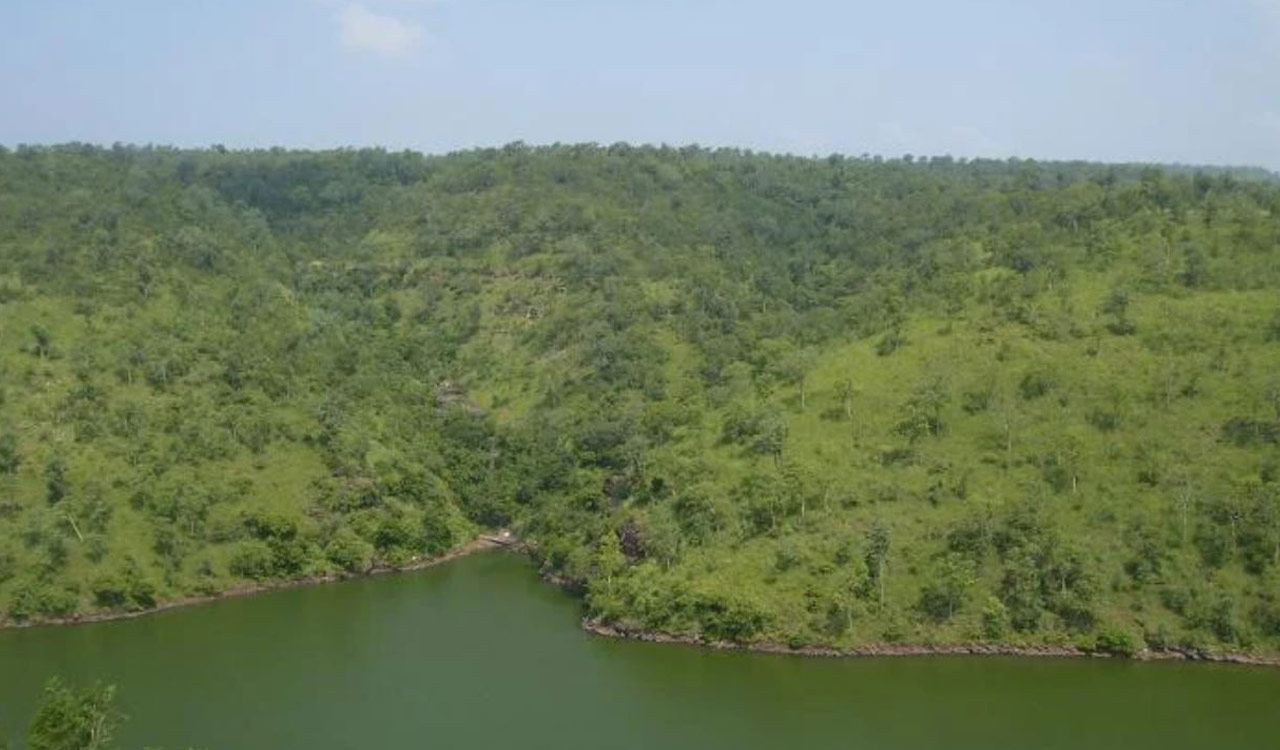Polavaram-Banakacherla tunnel poses risk to Nallamala’s fragile ecosystem
A proposed 25.6-km tunnel under Andhra Pradesh’s Polavaram–Banakacherla Link Project has sparked widespread environmental and tribal rights concerns. The tunnel and its supporting infrastructure will impact over 16,000 hectares and endangering rare species like the Bengal tiger and Jerdon’s courser.

Hyderabad: The proposed 25.6 km tunnel as part of the controversial Polavaram-Banakacherla Link Project of Andhra Pradesh through the Nallamala forest, along with associated infrastructure such as canals, lift stations and reservoirs, poses a direct threat to the fragile ecosystem.
The Nallamala forest, stretching across Andhra Pradesh and Telangana, is one of India’s most ecologically rich regions. Spanning approximately 9,000 square kilometers, this dry deciduous and tropical forest is home to the Nagarjunasagar-Srisailam Tiger Reserve (NSTR).
Also Read
The forest supports rich biodiversity, including endangered species, unique ecosystems and critical watersheds that feed the Krishna and Penna rivers. The construction of the tunnel and related infrastructure is expected to impact approximately 16,883 hectares (41,717 acres) of forest land.
The environmental clearance proposal submitted by the Andhra Pradesh government to the Expert Appraisal Committee (EAC) of the Ministry of Environment was already rejected on different counts including the enormity of its impact on the environment. The project, it is feared, would cause direct deforestation also.
The tunnel’s construction will require clearing large stretches of forest for the tunnel alignment, access roads and construction sites. Environmentalists estimate that at least 5,000-7,000 hectares of dense forest cover could be impacted. It includes critical habitats for species like the Bengal Tiger, Indian leopard, sloth bear and Chowsingha (four-horned antelope).
The tunnel and associated infrastructure will fragment the Nallamala forest, creating barriers that disrupt wildlife corridors, experts point out. The Nagarjunasagar-Srisailam Tiger Reserve (NSTR), which spans 3,568 square kilometers, is a critical habitat for tigers and other large mammals that require contiguous forest cover for movement and breeding.
Fragmentation could isolate populations, reduce genetic diversity and increase human-wildlife conflict as animals are displaced into surrounding areas. Besides this, the Nallamala forest serves as a vital watershed for the Krishna and Penna rivers, regulating water flow and maintaining soil moisture.
The tunnel’s construction and water diversion could alter groundwater recharge patterns, reduce soil stability and increase erosion risks, say environmentalists, warning that these changes could degrade the forest’s ability to support its diverse flora, including medicinal plants and endemic species like the Red Sanders.
Land acquisition
The Nallamala forest is also home to the Chenchu tribe, which depends on the forest for their livelihoods. The project’s land acquisition, estimated at 48,000 acres (including 16,883 hectares of forest land), is likely to displace thousands of tribal families, threatening their cultural heritage and traditional knowledge systems.
Nallamala forest is a biodiversity hotspot, hosting over 600 species of plants, 200 species of birds, 60 species of mammals, and numerous reptiles and amphibians. The Bengal tiger, listed as endangered, relies on the NSTR for its survival. The forest also supports leopards, sloth bears, Indian pangolins and dholes (Indian wild dogs), all of which are vulnerable to habitat loss and fragmentation.
The forest is a critical habitat for endemic and migratory birds, including the critically endangered Jerdon’s courser (Rhinoptilus bitorquatus), which is found only in the Eastern Ghats. Construction activities could disrupt nesting sites and foraging grounds.
The forest’s streams and rivers support aquatic biodiversity, including fish species like the Deccan mahseer. Alterations to water flow and quality could threaten these species.
The Ashoka Trust for Research in Ecology and Environment has warned that the PBLP’s impact on the Nallamala forest could trigger a cascading effect, disrupting ecological balance and threatening the survival of endangered species.
The project could irreversibly damage the Nallamala forest and disrupt fragile ecosystems in the Godavari and Krishna deltas, says V. Prakash Rao, river water activist and former chairman of the Telangana Water Resources Development Corporation. He said a thorough and up-to-date environmental impact assessment that incorporates the concerns of all stakeholders is crucial.
Related News
-
Odisha government reviews protection of Lord Jagannath temple lands
2 hours ago -
Iran holds military drills with Russia as US carrier moves closer
2 hours ago -
This is taxpayers’ money: Supreme Court raps freebies culture
3 hours ago -
Hyderabad: Residents oppose Gandhi Sarovar Project over ‘forcible’ land acquisition
3 hours ago -
Australia level series as Indian women slide to 19-run defeat in second T20I
3 hours ago -
Karnataka beat Uttarakhand in semis, to face Jammu and Kashmir in Ranji final
3 hours ago -
Five Osmania varsity players in South Zone squad for Vizzy Trophy
4 hours ago -
Disciplined West Indies bundle out Italy with ease, tops Group C in T20 WC
4 hours ago




